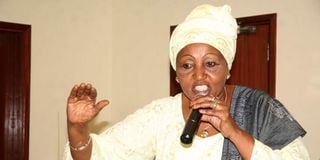Kiswahili wordsmiths spice up Jubilee, Nasa campaigns

Mombasa Governor Ali Hassan Joho addresses his supporters during Nasa's first official Presidential campaign at Bukhungu Stadium in Kakamega County on June 3, 2017. PHOTO | TONNY OMONDI | NATION MEDIA GROUP
What you need to know:
Ms Zainab Chidzuga, who defected from ODM and has been cheering up the crowds.
University of Nairobi’s Prof Abdulaziz Mohamed attributes these verbal contests to culture.
Away from the rallies, parties have also found use for the sweet-talking politicians at press conferences.
Since veteran coastal politician Shariff Nassir coined the phrase “wapende wasipende (whether they like it or not)” in the 1990s, politicians from the region noticeably continue to charm the electorate with catchy campaign slogans and flowery Swahili idioms during campaign season.
Presently, the likes of Mombasa County governor Hassan Joho and MPs Zainab Chidzuga (Kwale woman rep), Aisha Jumwa (Kilifi woman rep) and Mishi Mboko (Mombasa woman rep), Naomi Shabaan (Taveta) and Khatib Mwashetani (Lunga Lunga) are among those busy working up crowds and spreading mirth in the countryside.
Their prominence has soared to the extent that issues of protocol sometimes take the backseat to accord them a chance to light up the campaigns.
OPPOSITION SUPPORTERS
Mr Joho has particularly become a hit among Opposition supporters.
And even where he is not listed as a speaker, crowds ordinarily demand that he address them – sometimes even after his party bosses have spoken.

Former Kwale Woman Representative Zainab Chidzuga who died in Nairobi on August 12, 2021.
Fashioning himself as “governor 001”, in reference to the constitutional code of Mombasa County, one of his trademark introductory lines is: “Mimi ndiye gavana ‘zero-zero-one’, adui nambari moja wa Uhuru Kenyatta (I am governor 001, (President) Uhuru Kenyatta’s enemy number one).”
He then characteristically brags, to cheering crowds, that he is beyond being bribed: “Ukiniletea bahasha, mimi nina bahasha yangu tayari. Nashukuru Mungu, bahasha ninayo yangu. Sitaki yako, my friend. (Do not bother bringing me an envelope (cash) because I already have mine. And I thank God I do. I do not need yours, my friend).”
CHEERING UP THE CROWDS
On the other side of the political divide is Ms Chidzuga, who defected from ODM and has been cheering up the crowds. Typically, she attacks Nasa presidential candidate Raila Odinga, whom she repeatedly observes, “Anafikiri kwamba kura za Wapwani ni zake za kuokota chini akiweka kwenye kikapu. Wakati huu atashangaa (He thinks the coastal vote is his for the picking. This time around he will be shocked).”
University of Nairobi’s Prof Abdulaziz Mohamed attributes these verbal contests to culture.
“Coastal communities cherish coded messaging, hence the tendency to spice up their communication with poetry, idioms, imagery and proverbs.
That probably also explains why they are at home with politicians who punctuate their speeches with ‘vitendawili’ (riddles),” says the Swahili syntax expert.
PSYCHOLOGY PRINCIPLE
Literature scholar, Dr Mumia Osaaji, partly attributes the trend to the psychology principle, which suggests that people get fascinated with what they do not have but wish to acquire: “Kenyans would wish to speak good Swahili, but because of disinterest and other influences, including mother-tongue, their command is poor.

Kilifi Woman Rep Aisha Jumwa at a past event. PHOTO | KAZUNGU SAMUEL | NATION MEDIA GROUP
So, naturally those who can speak it so flawlessly, have a way of arresting our attention,” he said.
Ms Jumwa, who has lately “owned” the tag-line, “wakati ni sasa, kama sio sasa, ni sasa hivi (this is the time for change, if not now, then it is right now)”, is one such politician.
SWEET-TALKING POLITICIANS
Away from the rallies, parties have also found use for the sweet-talking politicians at press conferences.
Responding to National Assembly Majority Leader Aden Duale’s claim that ODM allied governors were funding Mr Odinga’s political activities, for instance, Ms Mboko hit back: “Uhuru na mwenzako Ruto, nyinyi ndio wenye meno kwa sababu vitengo vyote viko chini yenu.
Lakini twajua hamuezi kuchapa kazi kwa sababu mumezoea vya kunyonga, vya kuchinja hamuwezi (Uhuru and Ruto, you have the capacity to act, because all sectors are under your control. But, we know you cannot work effectively because you are used to easy ways).”
Mr Mwashetani hit back at the Opposition a week later: “Hawa wote walikuwa kwenye serikali za awali. Mmojawao waziri mkuu na wawili makamu wa rais.
Ni lipi lilikuja Pwani, ni lipi lilikuja Kilifi, ni lipi lilikuja Msambweni kwa niaba yao (They all served in previous governments as Prime Minister and two of them as vice-presidents. What development projects did they bring to the coast region, Kilifi, or Msambweni?)”
REPETITIVE LINES
Singling out Mr Mwashetani’s repetitive lines, Swahili scholar, Prof Kithaka wa Mberia, stresses the impact of rhythm and rhyme in communication: “Communication is not just about content, it is also about packaging.

Mombasa Woman Representative Mishi Mboko addressing journalists at Likoni Total ground on January 22, 2017. PHOTO | LABAN WALLOGA | NATION MEDIA GROUP
The use of repetition and rhyme in speech is particularly powerful, and that is why those who have embraced this style like (US President) Barack Obama and (human rights icon) Martin Luther King Jr, remain some of the world’s top orators to date.”
Prof Kithaka, who teaches at the University of Nairobi, observes that Swahili language has a repetitive flow, a factor that gives fluent speakers of the language an edge over their counterparts.
CHARMED AUDIENCES
Besides the current crop of politicians, Independence hero and Kadu party leader, Ronald Ngala, labour union leader Juma Boy, Mr Nassir, founder member of Ford party Ahmed Bamahriz and even former Kwale senator Boy Juma Boy charmed audiences across the country.
But this magical Kiswahili touch is not confined to the coastal politicians alone. Others who continue to arrest audiences with their impeccable Swahili include Migori senator Wilfred Machage and former Kimilili MP Mukhisa Kituyi, who is now head at the UN.
Yet still there is a crop of politicians, now and before, who albeit their clumsy treatment of Swahili, are crowd pullers.
The late Ezekiel Barng’etuny, Mulu Mutisya, Kariuki Chotara and Kihika Kimani, in particular, reigned during the Jomo Kenyatta and Daniel arap Moi regimes.





